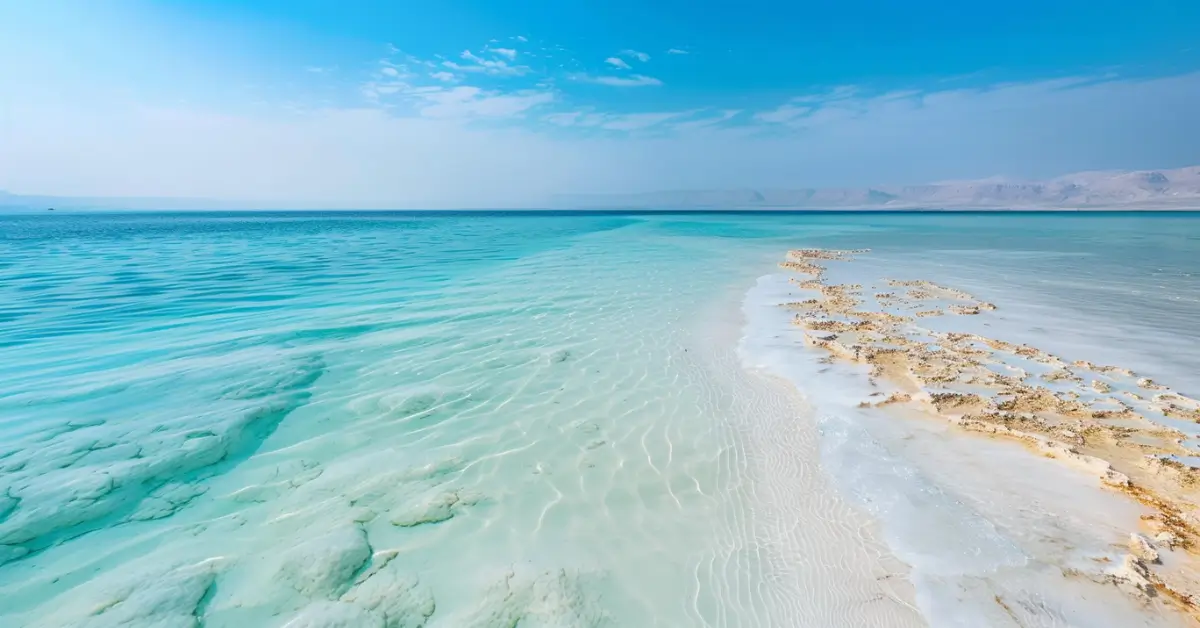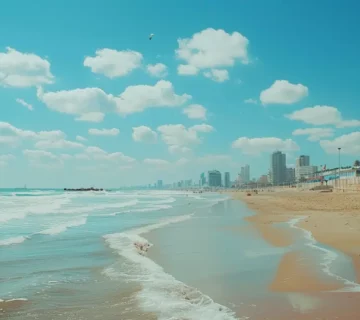Swimming in the Dead Sea is not only possible but a truly unique experience that draws visitors worldwide. Renowned for its extreme salinity and rich mineral content, this remarkable body of water offers conditions found nowhere else on the planet. In this comprehensive guide, we’ll cover everything you need to know to answer whether you can swim in the Dead Sea, from safety precautions to the unique experiences it offers.
Introduction: The Allure of the Dead Sea
The Dead Sea, bordering Israel and Jordan, is one of the saltiest bodies of water in the world, with a saline concentration of about 34%. This high salinity prevents aquatic life from thriving, hence the name “Dead Sea.” The allure of floating effortlessly in its waters and the therapeutic benefits attributed to its mineral-rich mud make it a popular spot for tourists.
The Benefits of the Dead Sea
The Dead Sea is famous not just for its unique swimming experience but also for its significant health benefits. Mineral-rich waters help with skin conditions like psoriasis and eczema, and mud is used in various therapeutic and beauty treatments. Breathing in the low-pollution, pollen-free air around the Dead Sea also provides respiratory benefits, making this spot a health retreat and tourist destination.
Understanding the Dead Sea’s Unique Composition
The Dead Sea is located in the eastern part of the country and serves as a border between the State of Israel and the Kingdom of Jordan. It is the lowest sea in the world, situated in the “Dead Sea Rift” (also known as the “Syrian-African Rift”), and it is of significant environmental, economic, cultural, and tourist importance.
The Dead Sea’s unique water composition, rich in magnesium, potassium, and calcium, creates a unique swimming experience.
Safety Tips for Swimming in the Dead Sea
Swimming in such high salinity requires precautions to ensure a safe and enjoyable experience. Here, we discuss the dos and don’ts, like avoiding getting water in your eyes or mouth, and what to do in case of skin irritation.
Best Times and Places to Swim in the Dead Sea
Many travelers must try swimming in the Dead Sea. The timing of your swim and the choice of location can significantly enhance your experience, ensuring comfort and enjoyment. Here’s a guide to the best times of the year and the ideal spots along the Dead Sea for taking a dip.
Best Times of the Year to Swim in the Dead Sea
The Dead Sea has a desert climate with sweltering summers and mild winters. The optimal times for swimming are usually during the spring (March to May) and autumn (September to November). During these months, the temperatures are more comfortable, ranging from 20°C to 30°C (68°F to 86°F), making it ideal for spending extended periods in and around the water.
Summer can be oppressively hot from June to August, with daytime temperatures often soaring above 40°C (104°F). While swimming in the super-saline water can be refreshing, the intense sun can lead to sunburns or heat exhaustion, particularly during the peak hours of the day.
Winter sees cooler weather from December to February, with temperatures dipping below 20°C (68°F). While it’s still possible to swim, the cooler air might make the experience less enjoyable for some, though it’s a quiet time for those seeking solitude.
Best Places to Swim in the Dead Sea
The Dead Sea stretches along the borders of Jordan and Israel, with numerous access points from both countries. Here are some recommendations for the best spots to enjoy a swim:
- In Israel:
- Ein Bokek: This resort area is home to many of the region’s luxury hotels and public beaches. The beaches here are well-maintained, with facilities such as showers and changing rooms. Ein Bokek tends to be more crowded but offers a robust tourist infrastructure.
- Mineral Beach: Known for its therapeutic properties, this beach offers a more curated experience with mud baths and spa services. It’s an excellent spot for those looking to combine swimming with some pampering.
- In Jordan:
- Amman Beach: This public beach is one of the most accessible spots in Amman, the capital city. It features facilities such as pools, changing rooms, and restaurants. While it can get crowded, its amenities make it a convenient option.
- O Beach: Known for its luxury and less crowded environment, it offers a premium experience with excellent facilities and fewer tourists. It’s ideal for those looking to enjoy the Dead Sea away from the crowds.
Optimal Time of Day to Swim
To avoid the harsh sun and heat, the best time to swim in the Dead Sea is early morning or late afternoon, around sunset. These times offer a respite from the intense heat and magical light conditions for those unforgettable photographs.
Furthermore, choosing less crowded beaches or visiting during the weekdays can enhance your experience, allowing for a more serene and intimate encounter with this natural wonder. Each location around the Dead Sea has unique charm and benefits, so consider what type of experience you are looking for when planning your visit.
Conclusion: A Must-Visit for Adventurous Swimmers
The Dead Sea is a unique destination that offers a swimming experience. Floating effortlessly in its saline waters offers profound relaxation and provides health benefits from the mineral-rich environment. With optimal swimming times in the more fantastic spring and autumn months and a selection of well-maintained beaches, your visit can be as comfortable as it is memorable. Whether looking for therapeutic relief or an unforgettable swim, the Dead Sea is a must-visit spot for every adventurous traveler. Embrace the natural wonder, respect the environment, and enjoy a singular experience in one of the world’s most extraordinary bodies of water.
FAQs
What should I wear while swimming in the Dead Sea?
When swimming in the Dead Sea, wearing old swimwear is advisable as the high mineral content can damage fabrics over time. Choose comfortable, protective swimwear that you don’t mind getting exposed to the salty water and mineral-rich mud. Additionally, due to the intense sunlight in the area, wearing a hat and UV-protective sunglasses, along with applying waterproof sunscreen, is crucial to protect against sunburn.
How does the Dead Sea affect sensitive skin?
The high mineral content of the Dead Sea, while beneficial for various skin conditions, can be harsh on sensitive skin. Individuals with skin conditions such as eczema or psoriasis may experience relief from symptoms, but the intense salinity can cause irritation or discomfort for those with susceptible skin. It’s essential to rinse off the saltwater with fresh water immediately after exiting to minimize potential irritation. Initially, consider a patch test or a shorter exposure time.
Is it safe to swim in the Dead Sea alone?
Due to its unique buoyancy and depth, swimming in the Dead Sea alone is not advisable. While saltwater makes it challenging to submerge and promotes floating, getting water in your eyes or accidentally swallowing it can be distressing and dangerous. It’s best to swim in designated areas where lifeguards are present, and always inform someone of your plans when heading out for a swim.
What are the emergency procedures in the Dead Sea area?
Emergency procedures in the Dead Sea area include prompt first aid response and quick accessibility to medical services. Most public beaches and resorts are equipped with first aid stations. Lifeguards are trained to handle situations unique to the high-salinity waters. Recognizing signs of dehydration and heat exhaustion shared in this hot, arid region is important. Tourists are advised to have local emergency numbers and ensure they are in areas with cellphone coverage.
Can children swim in the Dead Sea?
Children can “swim” in the Dead Sea, but extreme caution should be exercised. The buoyant waters can make it difficult for children to keep their balance, and the risk of getting salt water in their eyes or mouth is high. Children must be constantly supervised by adults and remain in shallow, designated swimming areas. Using flotation devices for added safety is also recommended.
Are there lifeguards at beaches around the Dead Sea?
Many famous beaches around the Dead Sea have lifeguards on duty, especially those near hotels and public access areas. However, coverage and hours can vary, so it’s best to check the availability of lifeguard services and adhere to their guidance during your visit. Always choose a beach with a lifeguard presence for the safest swimming experience.



